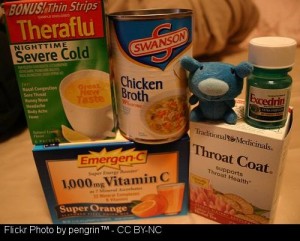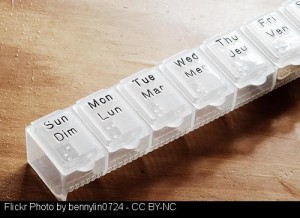By CYN LoPINTO
Editor-in-chief, gerontologist
 We are finally entering the time of year in which cooler temperatures let our bodies experience a change in season. This can also bring about that dreaded winter cold. Add to this the number of people from all over the world traveling in and out of the U. S. and you have a real increased risk of health problems. Although some of us will be forced to go to the doctor to get treatment, many of us will use over-the-counter medication for relief. Whenever you take any type of medicine (prescription or non-prescription), be sure to practice certain precautions and guidelines. By making sure you follow these simple safeguards, you will have a better chance of getting through the “cold and flu season” with optimal results and less side effects.
We are finally entering the time of year in which cooler temperatures let our bodies experience a change in season. This can also bring about that dreaded winter cold. Add to this the number of people from all over the world traveling in and out of the U. S. and you have a real increased risk of health problems. Although some of us will be forced to go to the doctor to get treatment, many of us will use over-the-counter medication for relief. Whenever you take any type of medicine (prescription or non-prescription), be sure to practice certain precautions and guidelines. By making sure you follow these simple safeguards, you will have a better chance of getting through the “cold and flu season” with optimal results and less side effects.
Combinations To Consider
Medicine/Medicine
Make sure to tell your doctor and pharmacist about all medication that you are using (both prescription and over the counter). Certain drugs should never be taken in combination and some will be more effective if taken at different times during the day. Some have to be taken alone. If the healthcare professionals you go to are made aware of this, they can work with you on setting up a safe and organized schedule for taking your medicine.
When food is present in the digestive system, it can affect the absorption of certain types of medicine. Conversely, certain drugs can affect the absorption of nutrients from the foods we eat. It is important to pay attention to whether or not a certain medication should be taken with food or on an empty stomach. Ask your doctor or pharmacist if you should stay clear of certain foods while taking a particular medication. If you are taking your iron supplements with a glass of milk, for example, you could be getting less iron than you think since milk is known to affect absorption of this mineral. Since vitamin C helps in the absorption of iron, you would be better off drinking it down with a glass of orange juice.
Medicine/Medical Conditions
If you have a particular medical condition (such as high blood pressure, diabetes or glaucoma), you should not be taking certain medications. Some warnings are listed on the label of an over-the-counter medicine or on the fact sheet that comes with a prescription. To be on the safe side, however, it is always a good idea to ask your doctor or pharmacist about the medicine in question and warnings concerning your individual situation.
Medicine/Alcohol
There are many over-the-counter medicines as well as prescription drugs that have a negative effect when taken with alcohol. As well as hampering the medicine’s potency, alcohol can cause drowsiness which could result in a potentially dangerous situation. Make sure you read all labels and warnings before consuming any amount of alcohol if you are taking medication.
 Things To Let Your Doctor Know
Things To Let Your Doctor Know
All Medicines That You Are Taking
This includes all over-the-counter products such as laxatives, eye drops, dietary and herbal supplements, topical creams and vitamins. Also make sure your physician is aware of all prescriptions you are taking, especially ones from other doctors.
Your Complete Medical History
Your physician should be aware of any accidents, illnesses or surgeries you have had. He/she would also need to know if there were any problems or side effects in relationship with these. Allergies to medicine, food or other substances need to be documented as well.
Your Eating Habits
Have you changed your diet recently (low carb, low fat, low sodium, vegetarian or high calcium)? Do you skip meals, eat late at night, regularly consume alcohol and caffeine? This information will help your doctor keep an eye on your health. Also include any food allergies and if you use any tobacco products.
 If You Have Trouble Telling Your Medication Apart
If You Have Trouble Telling Your Medication Apart
Your pharmacist may be willing to package your prescriptions in containers that have a very different look from one another. There are many products available to help you organize your medication as well. There are now color-coded pill boxes in large print and some can be ordered in a foreign language.
If You Have Trouble In Swallowing
The medication you are taking may be available in a liquid form. You may also be able to have your pills crushed or broken up. Make sure to check with your doctor before doing this because there are a lot of pills that should NEVER be crushed or broken (especially any time-released medicine).
If You Have Trouble Following Your Present Medication Schedule
If your lifestyle makes it difficult for you to take your pills when you are supposed to be taking them, you need to change the way you are doing things. For example, if you need to take a pill four times a day but find it too hard to do this, see if your doctor can prescribe a larger dose twice a day. Medicine only works if you are taking it correctly, and if you are skipping doses, you could be harming yourself.
Cynthia Lopinto
Latest posts by Cynthia Lopinto (see all)
- Honey Chocolate–Covered Pretzels - April 3, 2018
- True Colors - April 3, 2018
- Spring Cleaning…You’ve Gotta Be Kidding - April 2, 2018
- Should You Stay In Your Home Or Move During Retirement? - April 2, 2018
- Hawaiian Plants For Good Health - April 2, 2018
 Home Front Magazine A Publication for Seniors
Home Front Magazine A Publication for Seniors


